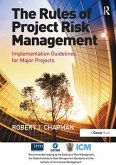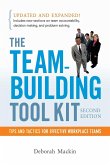Hedley Smyth
Relationship Management and the Management of Projects
Hedley Smyth
Relationship Management and the Management of Projects
- Gebundenes Buch
- Merkliste
- Auf die Merkliste
- Bewerten Bewerten
- Teilen
- Produkt teilen
- Produkterinnerung
- Produkterinnerung
Relationship Management and the Management of Projects is a guide to successfully building and managing relationships as a project manager and in the project business. Relationship management is a core skill for any project business to develop capabilities and manage the interface with projects, providing guidance to project managers as they negotiate with business partners and coordinate between business functions. Whatever the structures and procedures an organization has and whatever the project management tools and techniques, they are only as good as the hands they are in. Yet…mehr
Andere Kunden interessierten sich auch für
![Relationship Management and the Management of Projects Relationship Management and the Management of Projects]() Hedley SmythRelationship Management and the Management of Projects73,99 €
Hedley SmythRelationship Management and the Management of Projects73,99 €![The Spirit of Project Management The Spirit of Project Management]() Judi NealThe Spirit of Project Management67,99 €
Judi NealThe Spirit of Project Management67,99 €![The Rules of Project Risk Management The Rules of Project Risk Management]() Robert James ChapmanThe Rules of Project Risk Management72,99 €
Robert James ChapmanThe Rules of Project Risk Management72,99 €![The Practice of Management The Practice of Management]() Peter F. DruckerThe Practice of Management11,99 €
Peter F. DruckerThe Practice of Management11,99 €![Problem Structuring Approaches for the Management of Projects Problem Structuring Approaches for the Management of Projects]() Problem Structuring Approaches for the Management of Projects82,99 €
Problem Structuring Approaches for the Management of Projects82,99 €![The Team-Building Tool Kit The Team-Building Tool Kit]() Deborrah MackinThe Team-Building Tool Kit19,99 €
Deborrah MackinThe Team-Building Tool Kit19,99 €![The Relationship is the Project The Relationship is the Project]() The Relationship is the Project35,99 €
The Relationship is the Project35,99 €-
-
-
Relationship Management and the Management of Projects is a guide to successfully building and managing relationships as a project manager and in the project business. Relationship management is a core skill for any project business to develop capabilities and manage the interface with projects, providing guidance to project managers as they negotiate with business partners and coordinate between business functions. Whatever the structures and procedures an organization has and whatever the project management tools and techniques, they are only as good as the hands they are in. Yet relationship management, though a well-established discipline, is rarely applied to the process-driven world of project management. This book is a much-needed guide to the process of enhancing these skills to boost firm performance, team performance and develop collaborative practices. Hedley Smyth guides you through the processes of relationship management examining the theory and practice. This book highlights the range of options available to further develop current practices to ensure a successful relationship management in all stages of a project's lifecycle. Relationship Management and the Management of Projects is valuable reading for all students and specialists in project management, as well as project managers in business, management, the built environment, or indeed any industry.
Produktdetails
- Produktdetails
- Verlag: Routledge
- Seitenzahl: 314
- Erscheinungstermin: 18. September 2014
- Englisch
- Abmessung: 240mm x 161mm x 21mm
- Gewicht: 637g
- ISBN-13: 9780415705103
- ISBN-10: 041570510X
- Artikelnr.: 40814502
- Herstellerkennzeichnung
- Libri GmbH
- Europaallee 1
- 36244 Bad Hersfeld
- gpsr@libri.de
- Verlag: Routledge
- Seitenzahl: 314
- Erscheinungstermin: 18. September 2014
- Englisch
- Abmessung: 240mm x 161mm x 21mm
- Gewicht: 637g
- ISBN-13: 9780415705103
- ISBN-10: 041570510X
- Artikelnr.: 40814502
- Herstellerkennzeichnung
- Libri GmbH
- Europaallee 1
- 36244 Bad Hersfeld
- gpsr@libri.de
Hedley Smyth is Director of Research for the Bartlett School of Construction and Project Management, University College London. He has worked extensively in industry and academia and has been published in many leading journals and authored a wide range of books.
1. In the Beginning there are Relationships 2. Relational Contracting 3.
The Market, Marketing and Relationship Management 4. Emotional Intelligence
and Relationship Management 5. Trust and Relationship Management 6.
Organizational Culture 7. Organizational Behaviour and Systems Integration
8. Project Business and Project Decision-Making 9. Technical and
Technological Task Management and Service Provision 10. Moral Matters and
Project Business 11. Project Pervasiveness in Society and the Management of
Projects 12. The Social Space of Project Conduct
Chapter 1. In the Beginning there are Relationships
The social space of conduct for project businesses and projects is
interpersonal, cross-functional and inter-organizational relationships. The
tools and techniques of project management are only as good as the
relational hands they are in, yet management and researchers tend to hold
back from directly addressing management of organizational behaviour in
project businesses. Examining current practice and potential for
relationship management as a the systematic approach to managing
intra-organizational and inter-organizational relationships articulated by
procedures, behavioural programmes and codes is set out focusing upon a
range of ten substantive issues for the management of projects through
systematic strategies and action.
Chapter 2. Relational Contracting
Collaborative working practices have been to the fore over the last two or
three decades. Partnering, supply chain management and agile methods are
examples of relational contracting where the primary drivers arise in the
marketplace from clients and are implemented through contracts and
governance. These measure tend to induce reaction rather than the
transition to proactively develop and embed emergent supply side practices
across projects, in programmes and from investment in organizational
capabilities to transition to consistent and continuous improvement.
Relational contracting has induced change, yet less than claim or
anticipated, and its limits are scoped in theory and practice.
Chapter 3. The Market, Marketing and Relationship Management
A primary conceptual source for proactive relationship management arises
from relationship marketing. Value offered to clients has also to be
delivered. This requires a systematic approach to relationship management
along project lifecycles, supported by programme management and the
development of organisational capabilities. It is argued that relationship
management frames guidance, offering to control service consistency and
enhance integration yet scope for individuals and project teams to mobilize
creativity and problem solving abilities. In multi-organizational teams
there are tensions implementing relationship management, where developing
systems derived from different organizational contexts need be rapid
mobilization.
Chapter 4. Emotional Intelligence and Relationship Management
Developing from interpersonal skills, emotional intelligence is becoming
increasingly popular in management and research. Different approaches to
emotional intelligence are compared and contrasted, and specifically group
emotional intelligence is explored as a significant part of team working.
Personal and team behaviour is being applied to develop project practices.
Behavioural programmes applying the principles of emotional intelligence
are being used to enhance performance. Relationship management is a
constituent concept of emotional intelligence can also connect to a wider
relationship management system through leadership, behavioural programmes
and through informal set of routines.
Chapter 5. Trust and Relationship Management
Trust has received attention as part of project governance and relationship
contracting. It is recognized as important in relationship marketing,
emotional intelligence as well as being a construct in organizational
behaviour. Managing trust in temporal and multi-organizational project
teams is recognized as making a significance performance difference. Trust
is argued to have financial value to clients and project businesses, as
well as being part of the development of social capital within relationship
management that accrues in value with use. Practical means to assess trust
are presented to enhance relationship management at a detailed level of
operation.
Chapter 6. Organizational Culture
Organizational culture is about ways of doing things in project businesses
and on projects. The practical tension between managers saying they will
change organizational culture while it is also cited as a reason for not
being able to manage and change outcomes is addressed by reviewing several
conceptual approaches to organizational culture and showing how systems,
routines and organizational norms can be developed and renegotiated to
assist relationship management. This offers an approach contrasting with
the structural solutions to organizational processes faced in many project
businesses.
Chapter 7. Organizational Behaviour and Systems Integration
Organizational behaviour is the human side of work and relationships
articulate the interfaces with systems and functions coordinating and
routinizing roles. This works to articulate systems and integrate
activities. Relationships are both part of organizational behaviour to
facilitate other functions and capabilities and are capabilities of
effective performance. Organizational behaviour develops from the ground to
be developed into behavioural programmes and codes. These emergent
practices need to be embedded at organizational level to benefit project
management and business performance. Integration and coordination helps the
development of repeatable solutions at a generic level that are customised
and tailored for individual projects.
Chapter 8. Project Business and Project Decision-Making
One particular type of organizational behaviour is decision-making.
Decisions are the means to translate ideas and directions into applied
processes and actions. Decisions aim to improve performance from the
strategic board level down to operational levels. Rational and subjective
approaches to decision-making, including the application of rules of thumb,
are examined and the distorting factors of the mobilization of bias and
optimum bias related to career and political agendas are also examined.
Linking back to emotional intelligence, trust and cultural norms in
particular, management use of sense making and negotiation as part of
decision-making conduct is addressed.
Chapter 9. Technical and Technological Task Management and Service
Provision
The preoccupation of project managers and managers with technical
expertise, project management and a task focus is analysed. This is
contrasted with the service content, especially amongst project businesses
that subcontract most or all work and are service providers that integrate
the value provided by others. Relationships and their management are both
facilitators of service provision and is part of the service provision
experienced by clients and other stakeholder.
Chapter 10. Moral Matters and Project Business
Moral is an implicit if not explicit function of management. The moral
position adopted and the ethics applied concerning compliance with shared
norms, standards and regulatory regimes cannot be separated from the
operations of the firm. Morality can be consigned to risk management,
especially to relational risk. Over-emphasizing risk can lead to the
unintended violation of relationships and social contracts. Reasonable
morality is needed to underpin internal operations and market exchange. It
has a direct relation with internal social capital, particularly trust and
its management, that can be used to enhance service experience.
Chapter 11. Project Pervasiveness in Society and the Management of Projects
Projects have become pervasive in commercial business. The project mode of
operation is a primary delivery channel and the management of projects
provides the means. Meeting requirements to time, cost and quality/scope
are merely threshold criteria. Service during during execution is
repeatedly overlooked. Benefits in use and the impact are insufficiently
considered. The growing challenges presented by clients to meet the range
of organisational and societal problems will require successful project
businesses to proactively improve their technical and service capabilities,
and those that do through iterative and incremental investment will be
amongst those that survive and are the most successful.
Chapter 12. The Social Space of Project Conduct
Relationships are central project operations. They provide the social space
of project conduct. It is through relationships that value is identified,
levered and delivered, both as value added and added value. Relationship
management is a conceptually important and growing applied part of project
business models, and an important part of the management of projects.
Effective relationships and proactive relationship management contribute to
performance effectiveness and efficiency. Relationship management
contributes to integrated portfolio, programme and project management and
its structuring guides organizational behaviour. Overall, bringing the
management of projects and relationship management contributes to a
systematic and organizationally coordinated approach.
The Market, Marketing and Relationship Management 4. Emotional Intelligence
and Relationship Management 5. Trust and Relationship Management 6.
Organizational Culture 7. Organizational Behaviour and Systems Integration
8. Project Business and Project Decision-Making 9. Technical and
Technological Task Management and Service Provision 10. Moral Matters and
Project Business 11. Project Pervasiveness in Society and the Management of
Projects 12. The Social Space of Project Conduct
Chapter 1. In the Beginning there are Relationships
The social space of conduct for project businesses and projects is
interpersonal, cross-functional and inter-organizational relationships. The
tools and techniques of project management are only as good as the
relational hands they are in, yet management and researchers tend to hold
back from directly addressing management of organizational behaviour in
project businesses. Examining current practice and potential for
relationship management as a the systematic approach to managing
intra-organizational and inter-organizational relationships articulated by
procedures, behavioural programmes and codes is set out focusing upon a
range of ten substantive issues for the management of projects through
systematic strategies and action.
Chapter 2. Relational Contracting
Collaborative working practices have been to the fore over the last two or
three decades. Partnering, supply chain management and agile methods are
examples of relational contracting where the primary drivers arise in the
marketplace from clients and are implemented through contracts and
governance. These measure tend to induce reaction rather than the
transition to proactively develop and embed emergent supply side practices
across projects, in programmes and from investment in organizational
capabilities to transition to consistent and continuous improvement.
Relational contracting has induced change, yet less than claim or
anticipated, and its limits are scoped in theory and practice.
Chapter 3. The Market, Marketing and Relationship Management
A primary conceptual source for proactive relationship management arises
from relationship marketing. Value offered to clients has also to be
delivered. This requires a systematic approach to relationship management
along project lifecycles, supported by programme management and the
development of organisational capabilities. It is argued that relationship
management frames guidance, offering to control service consistency and
enhance integration yet scope for individuals and project teams to mobilize
creativity and problem solving abilities. In multi-organizational teams
there are tensions implementing relationship management, where developing
systems derived from different organizational contexts need be rapid
mobilization.
Chapter 4. Emotional Intelligence and Relationship Management
Developing from interpersonal skills, emotional intelligence is becoming
increasingly popular in management and research. Different approaches to
emotional intelligence are compared and contrasted, and specifically group
emotional intelligence is explored as a significant part of team working.
Personal and team behaviour is being applied to develop project practices.
Behavioural programmes applying the principles of emotional intelligence
are being used to enhance performance. Relationship management is a
constituent concept of emotional intelligence can also connect to a wider
relationship management system through leadership, behavioural programmes
and through informal set of routines.
Chapter 5. Trust and Relationship Management
Trust has received attention as part of project governance and relationship
contracting. It is recognized as important in relationship marketing,
emotional intelligence as well as being a construct in organizational
behaviour. Managing trust in temporal and multi-organizational project
teams is recognized as making a significance performance difference. Trust
is argued to have financial value to clients and project businesses, as
well as being part of the development of social capital within relationship
management that accrues in value with use. Practical means to assess trust
are presented to enhance relationship management at a detailed level of
operation.
Chapter 6. Organizational Culture
Organizational culture is about ways of doing things in project businesses
and on projects. The practical tension between managers saying they will
change organizational culture while it is also cited as a reason for not
being able to manage and change outcomes is addressed by reviewing several
conceptual approaches to organizational culture and showing how systems,
routines and organizational norms can be developed and renegotiated to
assist relationship management. This offers an approach contrasting with
the structural solutions to organizational processes faced in many project
businesses.
Chapter 7. Organizational Behaviour and Systems Integration
Organizational behaviour is the human side of work and relationships
articulate the interfaces with systems and functions coordinating and
routinizing roles. This works to articulate systems and integrate
activities. Relationships are both part of organizational behaviour to
facilitate other functions and capabilities and are capabilities of
effective performance. Organizational behaviour develops from the ground to
be developed into behavioural programmes and codes. These emergent
practices need to be embedded at organizational level to benefit project
management and business performance. Integration and coordination helps the
development of repeatable solutions at a generic level that are customised
and tailored for individual projects.
Chapter 8. Project Business and Project Decision-Making
One particular type of organizational behaviour is decision-making.
Decisions are the means to translate ideas and directions into applied
processes and actions. Decisions aim to improve performance from the
strategic board level down to operational levels. Rational and subjective
approaches to decision-making, including the application of rules of thumb,
are examined and the distorting factors of the mobilization of bias and
optimum bias related to career and political agendas are also examined.
Linking back to emotional intelligence, trust and cultural norms in
particular, management use of sense making and negotiation as part of
decision-making conduct is addressed.
Chapter 9. Technical and Technological Task Management and Service
Provision
The preoccupation of project managers and managers with technical
expertise, project management and a task focus is analysed. This is
contrasted with the service content, especially amongst project businesses
that subcontract most or all work and are service providers that integrate
the value provided by others. Relationships and their management are both
facilitators of service provision and is part of the service provision
experienced by clients and other stakeholder.
Chapter 10. Moral Matters and Project Business
Moral is an implicit if not explicit function of management. The moral
position adopted and the ethics applied concerning compliance with shared
norms, standards and regulatory regimes cannot be separated from the
operations of the firm. Morality can be consigned to risk management,
especially to relational risk. Over-emphasizing risk can lead to the
unintended violation of relationships and social contracts. Reasonable
morality is needed to underpin internal operations and market exchange. It
has a direct relation with internal social capital, particularly trust and
its management, that can be used to enhance service experience.
Chapter 11. Project Pervasiveness in Society and the Management of Projects
Projects have become pervasive in commercial business. The project mode of
operation is a primary delivery channel and the management of projects
provides the means. Meeting requirements to time, cost and quality/scope
are merely threshold criteria. Service during during execution is
repeatedly overlooked. Benefits in use and the impact are insufficiently
considered. The growing challenges presented by clients to meet the range
of organisational and societal problems will require successful project
businesses to proactively improve their technical and service capabilities,
and those that do through iterative and incremental investment will be
amongst those that survive and are the most successful.
Chapter 12. The Social Space of Project Conduct
Relationships are central project operations. They provide the social space
of project conduct. It is through relationships that value is identified,
levered and delivered, both as value added and added value. Relationship
management is a conceptually important and growing applied part of project
business models, and an important part of the management of projects.
Effective relationships and proactive relationship management contribute to
performance effectiveness and efficiency. Relationship management
contributes to integrated portfolio, programme and project management and
its structuring guides organizational behaviour. Overall, bringing the
management of projects and relationship management contributes to a
systematic and organizationally coordinated approach.
1. In the Beginning there are Relationships 2. Relational Contracting 3.
The Market, Marketing and Relationship Management 4. Emotional Intelligence
and Relationship Management 5. Trust and Relationship Management 6.
Organizational Culture 7. Organizational Behaviour and Systems Integration
8. Project Business and Project Decision-Making 9. Technical and
Technological Task Management and Service Provision 10. Moral Matters and
Project Business 11. Project Pervasiveness in Society and the Management of
Projects 12. The Social Space of Project Conduct
Chapter 1. In the Beginning there are Relationships
The social space of conduct for project businesses and projects is
interpersonal, cross-functional and inter-organizational relationships. The
tools and techniques of project management are only as good as the
relational hands they are in, yet management and researchers tend to hold
back from directly addressing management of organizational behaviour in
project businesses. Examining current practice and potential for
relationship management as a the systematic approach to managing
intra-organizational and inter-organizational relationships articulated by
procedures, behavioural programmes and codes is set out focusing upon a
range of ten substantive issues for the management of projects through
systematic strategies and action.
Chapter 2. Relational Contracting
Collaborative working practices have been to the fore over the last two or
three decades. Partnering, supply chain management and agile methods are
examples of relational contracting where the primary drivers arise in the
marketplace from clients and are implemented through contracts and
governance. These measure tend to induce reaction rather than the
transition to proactively develop and embed emergent supply side practices
across projects, in programmes and from investment in organizational
capabilities to transition to consistent and continuous improvement.
Relational contracting has induced change, yet less than claim or
anticipated, and its limits are scoped in theory and practice.
Chapter 3. The Market, Marketing and Relationship Management
A primary conceptual source for proactive relationship management arises
from relationship marketing. Value offered to clients has also to be
delivered. This requires a systematic approach to relationship management
along project lifecycles, supported by programme management and the
development of organisational capabilities. It is argued that relationship
management frames guidance, offering to control service consistency and
enhance integration yet scope for individuals and project teams to mobilize
creativity and problem solving abilities. In multi-organizational teams
there are tensions implementing relationship management, where developing
systems derived from different organizational contexts need be rapid
mobilization.
Chapter 4. Emotional Intelligence and Relationship Management
Developing from interpersonal skills, emotional intelligence is becoming
increasingly popular in management and research. Different approaches to
emotional intelligence are compared and contrasted, and specifically group
emotional intelligence is explored as a significant part of team working.
Personal and team behaviour is being applied to develop project practices.
Behavioural programmes applying the principles of emotional intelligence
are being used to enhance performance. Relationship management is a
constituent concept of emotional intelligence can also connect to a wider
relationship management system through leadership, behavioural programmes
and through informal set of routines.
Chapter 5. Trust and Relationship Management
Trust has received attention as part of project governance and relationship
contracting. It is recognized as important in relationship marketing,
emotional intelligence as well as being a construct in organizational
behaviour. Managing trust in temporal and multi-organizational project
teams is recognized as making a significance performance difference. Trust
is argued to have financial value to clients and project businesses, as
well as being part of the development of social capital within relationship
management that accrues in value with use. Practical means to assess trust
are presented to enhance relationship management at a detailed level of
operation.
Chapter 6. Organizational Culture
Organizational culture is about ways of doing things in project businesses
and on projects. The practical tension between managers saying they will
change organizational culture while it is also cited as a reason for not
being able to manage and change outcomes is addressed by reviewing several
conceptual approaches to organizational culture and showing how systems,
routines and organizational norms can be developed and renegotiated to
assist relationship management. This offers an approach contrasting with
the structural solutions to organizational processes faced in many project
businesses.
Chapter 7. Organizational Behaviour and Systems Integration
Organizational behaviour is the human side of work and relationships
articulate the interfaces with systems and functions coordinating and
routinizing roles. This works to articulate systems and integrate
activities. Relationships are both part of organizational behaviour to
facilitate other functions and capabilities and are capabilities of
effective performance. Organizational behaviour develops from the ground to
be developed into behavioural programmes and codes. These emergent
practices need to be embedded at organizational level to benefit project
management and business performance. Integration and coordination helps the
development of repeatable solutions at a generic level that are customised
and tailored for individual projects.
Chapter 8. Project Business and Project Decision-Making
One particular type of organizational behaviour is decision-making.
Decisions are the means to translate ideas and directions into applied
processes and actions. Decisions aim to improve performance from the
strategic board level down to operational levels. Rational and subjective
approaches to decision-making, including the application of rules of thumb,
are examined and the distorting factors of the mobilization of bias and
optimum bias related to career and political agendas are also examined.
Linking back to emotional intelligence, trust and cultural norms in
particular, management use of sense making and negotiation as part of
decision-making conduct is addressed.
Chapter 9. Technical and Technological Task Management and Service
Provision
The preoccupation of project managers and managers with technical
expertise, project management and a task focus is analysed. This is
contrasted with the service content, especially amongst project businesses
that subcontract most or all work and are service providers that integrate
the value provided by others. Relationships and their management are both
facilitators of service provision and is part of the service provision
experienced by clients and other stakeholder.
Chapter 10. Moral Matters and Project Business
Moral is an implicit if not explicit function of management. The moral
position adopted and the ethics applied concerning compliance with shared
norms, standards and regulatory regimes cannot be separated from the
operations of the firm. Morality can be consigned to risk management,
especially to relational risk. Over-emphasizing risk can lead to the
unintended violation of relationships and social contracts. Reasonable
morality is needed to underpin internal operations and market exchange. It
has a direct relation with internal social capital, particularly trust and
its management, that can be used to enhance service experience.
Chapter 11. Project Pervasiveness in Society and the Management of Projects
Projects have become pervasive in commercial business. The project mode of
operation is a primary delivery channel and the management of projects
provides the means. Meeting requirements to time, cost and quality/scope
are merely threshold criteria. Service during during execution is
repeatedly overlooked. Benefits in use and the impact are insufficiently
considered. The growing challenges presented by clients to meet the range
of organisational and societal problems will require successful project
businesses to proactively improve their technical and service capabilities,
and those that do through iterative and incremental investment will be
amongst those that survive and are the most successful.
Chapter 12. The Social Space of Project Conduct
Relationships are central project operations. They provide the social space
of project conduct. It is through relationships that value is identified,
levered and delivered, both as value added and added value. Relationship
management is a conceptually important and growing applied part of project
business models, and an important part of the management of projects.
Effective relationships and proactive relationship management contribute to
performance effectiveness and efficiency. Relationship management
contributes to integrated portfolio, programme and project management and
its structuring guides organizational behaviour. Overall, bringing the
management of projects and relationship management contributes to a
systematic and organizationally coordinated approach.
The Market, Marketing and Relationship Management 4. Emotional Intelligence
and Relationship Management 5. Trust and Relationship Management 6.
Organizational Culture 7. Organizational Behaviour and Systems Integration
8. Project Business and Project Decision-Making 9. Technical and
Technological Task Management and Service Provision 10. Moral Matters and
Project Business 11. Project Pervasiveness in Society and the Management of
Projects 12. The Social Space of Project Conduct
Chapter 1. In the Beginning there are Relationships
The social space of conduct for project businesses and projects is
interpersonal, cross-functional and inter-organizational relationships. The
tools and techniques of project management are only as good as the
relational hands they are in, yet management and researchers tend to hold
back from directly addressing management of organizational behaviour in
project businesses. Examining current practice and potential for
relationship management as a the systematic approach to managing
intra-organizational and inter-organizational relationships articulated by
procedures, behavioural programmes and codes is set out focusing upon a
range of ten substantive issues for the management of projects through
systematic strategies and action.
Chapter 2. Relational Contracting
Collaborative working practices have been to the fore over the last two or
three decades. Partnering, supply chain management and agile methods are
examples of relational contracting where the primary drivers arise in the
marketplace from clients and are implemented through contracts and
governance. These measure tend to induce reaction rather than the
transition to proactively develop and embed emergent supply side practices
across projects, in programmes and from investment in organizational
capabilities to transition to consistent and continuous improvement.
Relational contracting has induced change, yet less than claim or
anticipated, and its limits are scoped in theory and practice.
Chapter 3. The Market, Marketing and Relationship Management
A primary conceptual source for proactive relationship management arises
from relationship marketing. Value offered to clients has also to be
delivered. This requires a systematic approach to relationship management
along project lifecycles, supported by programme management and the
development of organisational capabilities. It is argued that relationship
management frames guidance, offering to control service consistency and
enhance integration yet scope for individuals and project teams to mobilize
creativity and problem solving abilities. In multi-organizational teams
there are tensions implementing relationship management, where developing
systems derived from different organizational contexts need be rapid
mobilization.
Chapter 4. Emotional Intelligence and Relationship Management
Developing from interpersonal skills, emotional intelligence is becoming
increasingly popular in management and research. Different approaches to
emotional intelligence are compared and contrasted, and specifically group
emotional intelligence is explored as a significant part of team working.
Personal and team behaviour is being applied to develop project practices.
Behavioural programmes applying the principles of emotional intelligence
are being used to enhance performance. Relationship management is a
constituent concept of emotional intelligence can also connect to a wider
relationship management system through leadership, behavioural programmes
and through informal set of routines.
Chapter 5. Trust and Relationship Management
Trust has received attention as part of project governance and relationship
contracting. It is recognized as important in relationship marketing,
emotional intelligence as well as being a construct in organizational
behaviour. Managing trust in temporal and multi-organizational project
teams is recognized as making a significance performance difference. Trust
is argued to have financial value to clients and project businesses, as
well as being part of the development of social capital within relationship
management that accrues in value with use. Practical means to assess trust
are presented to enhance relationship management at a detailed level of
operation.
Chapter 6. Organizational Culture
Organizational culture is about ways of doing things in project businesses
and on projects. The practical tension between managers saying they will
change organizational culture while it is also cited as a reason for not
being able to manage and change outcomes is addressed by reviewing several
conceptual approaches to organizational culture and showing how systems,
routines and organizational norms can be developed and renegotiated to
assist relationship management. This offers an approach contrasting with
the structural solutions to organizational processes faced in many project
businesses.
Chapter 7. Organizational Behaviour and Systems Integration
Organizational behaviour is the human side of work and relationships
articulate the interfaces with systems and functions coordinating and
routinizing roles. This works to articulate systems and integrate
activities. Relationships are both part of organizational behaviour to
facilitate other functions and capabilities and are capabilities of
effective performance. Organizational behaviour develops from the ground to
be developed into behavioural programmes and codes. These emergent
practices need to be embedded at organizational level to benefit project
management and business performance. Integration and coordination helps the
development of repeatable solutions at a generic level that are customised
and tailored for individual projects.
Chapter 8. Project Business and Project Decision-Making
One particular type of organizational behaviour is decision-making.
Decisions are the means to translate ideas and directions into applied
processes and actions. Decisions aim to improve performance from the
strategic board level down to operational levels. Rational and subjective
approaches to decision-making, including the application of rules of thumb,
are examined and the distorting factors of the mobilization of bias and
optimum bias related to career and political agendas are also examined.
Linking back to emotional intelligence, trust and cultural norms in
particular, management use of sense making and negotiation as part of
decision-making conduct is addressed.
Chapter 9. Technical and Technological Task Management and Service
Provision
The preoccupation of project managers and managers with technical
expertise, project management and a task focus is analysed. This is
contrasted with the service content, especially amongst project businesses
that subcontract most or all work and are service providers that integrate
the value provided by others. Relationships and their management are both
facilitators of service provision and is part of the service provision
experienced by clients and other stakeholder.
Chapter 10. Moral Matters and Project Business
Moral is an implicit if not explicit function of management. The moral
position adopted and the ethics applied concerning compliance with shared
norms, standards and regulatory regimes cannot be separated from the
operations of the firm. Morality can be consigned to risk management,
especially to relational risk. Over-emphasizing risk can lead to the
unintended violation of relationships and social contracts. Reasonable
morality is needed to underpin internal operations and market exchange. It
has a direct relation with internal social capital, particularly trust and
its management, that can be used to enhance service experience.
Chapter 11. Project Pervasiveness in Society and the Management of Projects
Projects have become pervasive in commercial business. The project mode of
operation is a primary delivery channel and the management of projects
provides the means. Meeting requirements to time, cost and quality/scope
are merely threshold criteria. Service during during execution is
repeatedly overlooked. Benefits in use and the impact are insufficiently
considered. The growing challenges presented by clients to meet the range
of organisational and societal problems will require successful project
businesses to proactively improve their technical and service capabilities,
and those that do through iterative and incremental investment will be
amongst those that survive and are the most successful.
Chapter 12. The Social Space of Project Conduct
Relationships are central project operations. They provide the social space
of project conduct. It is through relationships that value is identified,
levered and delivered, both as value added and added value. Relationship
management is a conceptually important and growing applied part of project
business models, and an important part of the management of projects.
Effective relationships and proactive relationship management contribute to
performance effectiveness and efficiency. Relationship management
contributes to integrated portfolio, programme and project management and
its structuring guides organizational behaviour. Overall, bringing the
management of projects and relationship management contributes to a
systematic and organizationally coordinated approach.








